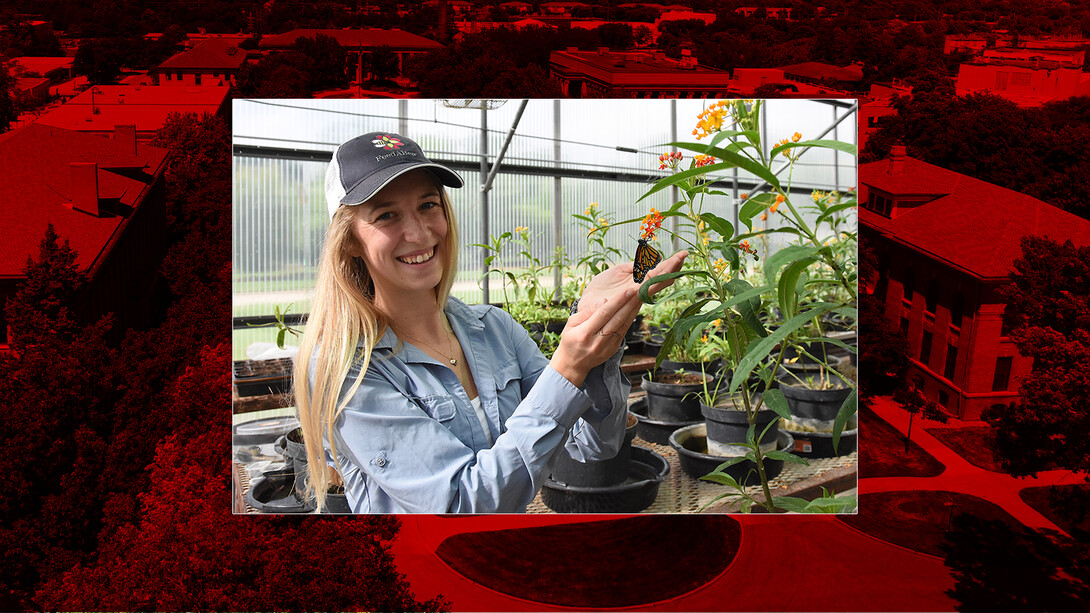
Hometown: Stevensville, Maryland
Major: Entomology, Doctorate Degree
Anticipated Date of Graduation: August 2021
Why did you decide to come to the University of Nebraska-Lincoln?
After graduating with my bachelor’s degree from the University of Wyoming, I spent the following two years working at Bayer Crop Science. I knew I would need to go back for a doctorate degree and when I did, I wanted to be connected to a top tier agriculture school. While working at Bayer, I met several UNL entomology alumni and heard nothing but good things about the program. During that time, I met my advisor, Dr. Troy Anderson, at a conference. After talking with him, I jumped at the opportunity to come to UNL and work with him on a project with monarch butterflies.
What is your favorite thing about University of Nebraska-Lincoln?
Getting to learn from diverse, international perspectives. University campuses are a hub for creativity with people and perspectives coming together from around the world! Hearing how different agriculture can look across the globe and the different challenges each area faces inspires me to think more broadly about my research and how I can contribute to finding global solutions for agriculture and the environment.
How has diversity and inclusive excellence played a role in your CASNR experience?
Working with international professors and students has played a large role in where I see myself in the future. I was lucky enough to take agroecology with several students from Rwanda and hear about their agricultural landscape and the issues they face with soil conservation. In the Entomology Department, I have gotten to hear about crop production in Brazil and challenges for conserving biodiversity. Hearing about global challenges in agriculture and conservation inspired me to organize a session on “Increasing the world’s food production in the face of global insect declines” at a World Congress meeting for the Society of Environmental Toxicology and Chemistry this fall. Unfortunately, the conference has been postponed but I look forward to continuing the conversation around conservation and agriculture on a global scale.
What is your favorite class you have taken so far and why?
Ironically, my favorite formal class has been an independent study. I took AGRO 896: Soil Carbon and Nitrogen Dynamics. I am not a soil scientist by any stretch of the imagination, but I was interested in the topic and my advisor let me enroll! I had taken AGRO 855: Soil Chemistry from the instructor, Dr. Michael Kaiser, the semester before and had never experienced a teaching style like his. He required input from the students in every lecture which often sparked interesting conversations, and for each test, students first took the test individually and then immediately retook the test with a small group of students. It was such a great learning environment and so exciting to learn about something completely new!
What are your plans post-graduation?
It is hard to have any definitive plan these days, but I hope to work in regulatory, either within the agrochemical industry or a government agency like USFWS or USEPA. Having worked with both pesticide risk assessment and endangered species regulation, I hope to continue working in this field to help find solutions for productive agriculture and conservation goals.
What’s life like outside of school?
Life outside of school is limited but mostly revolves around my dog Hudson and our shared love of water, whether that’s swimming, kayaking, or finding a stream while on a hike! Otherwise I take trips to see family in Wyoming where we can hike and camp. If I had more time, I would spend it throwing pottery and scuba diving!
Annie has received the following scholarships: FFAR Professional Development Fellowship, UNL Johnson-Beck Graduate Student Fellowship for Nature Conservation, Friends of Sunset Zoo Robert Klemm Conservation Scholar Award and the UNL Othmer Fellowship.







